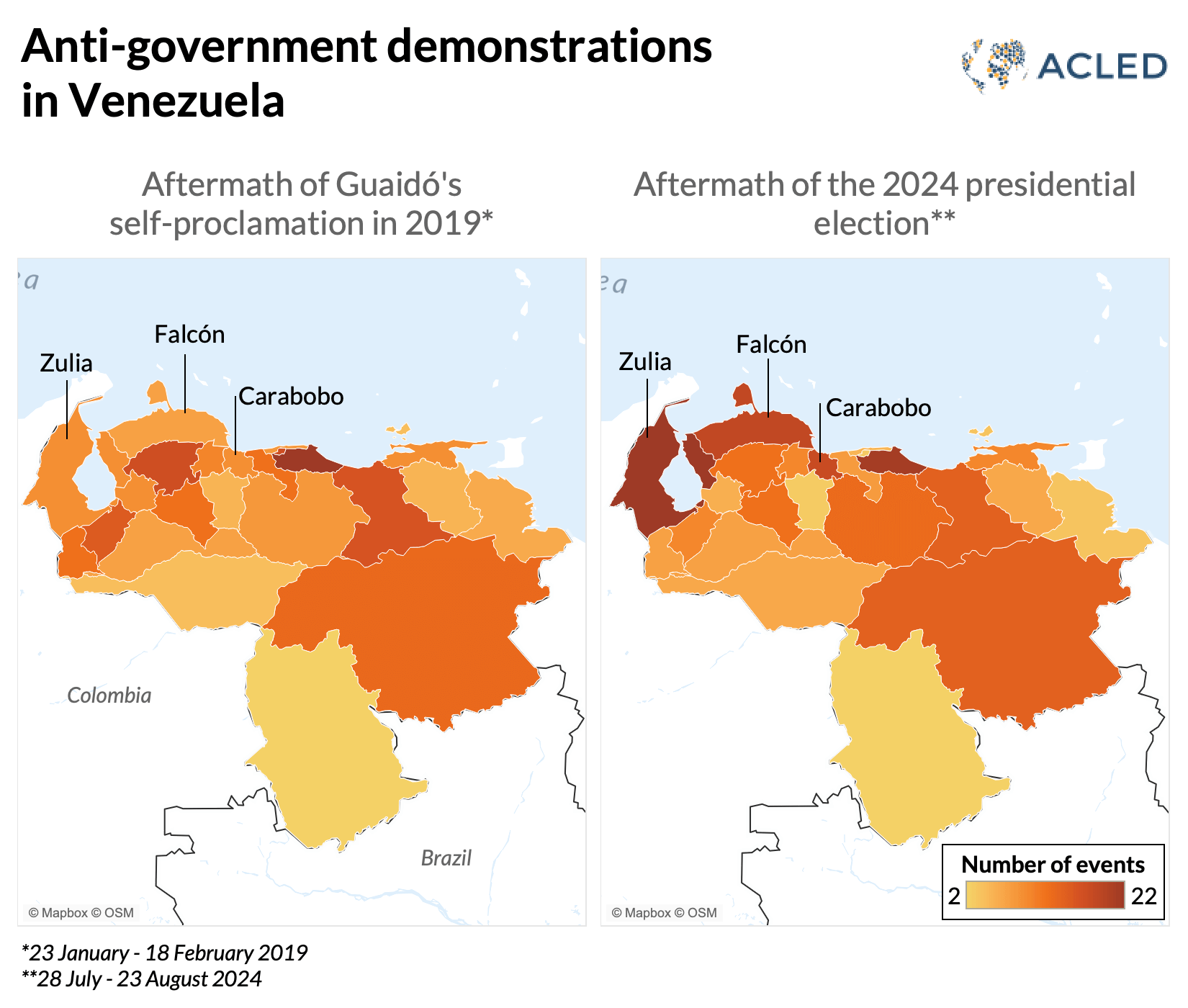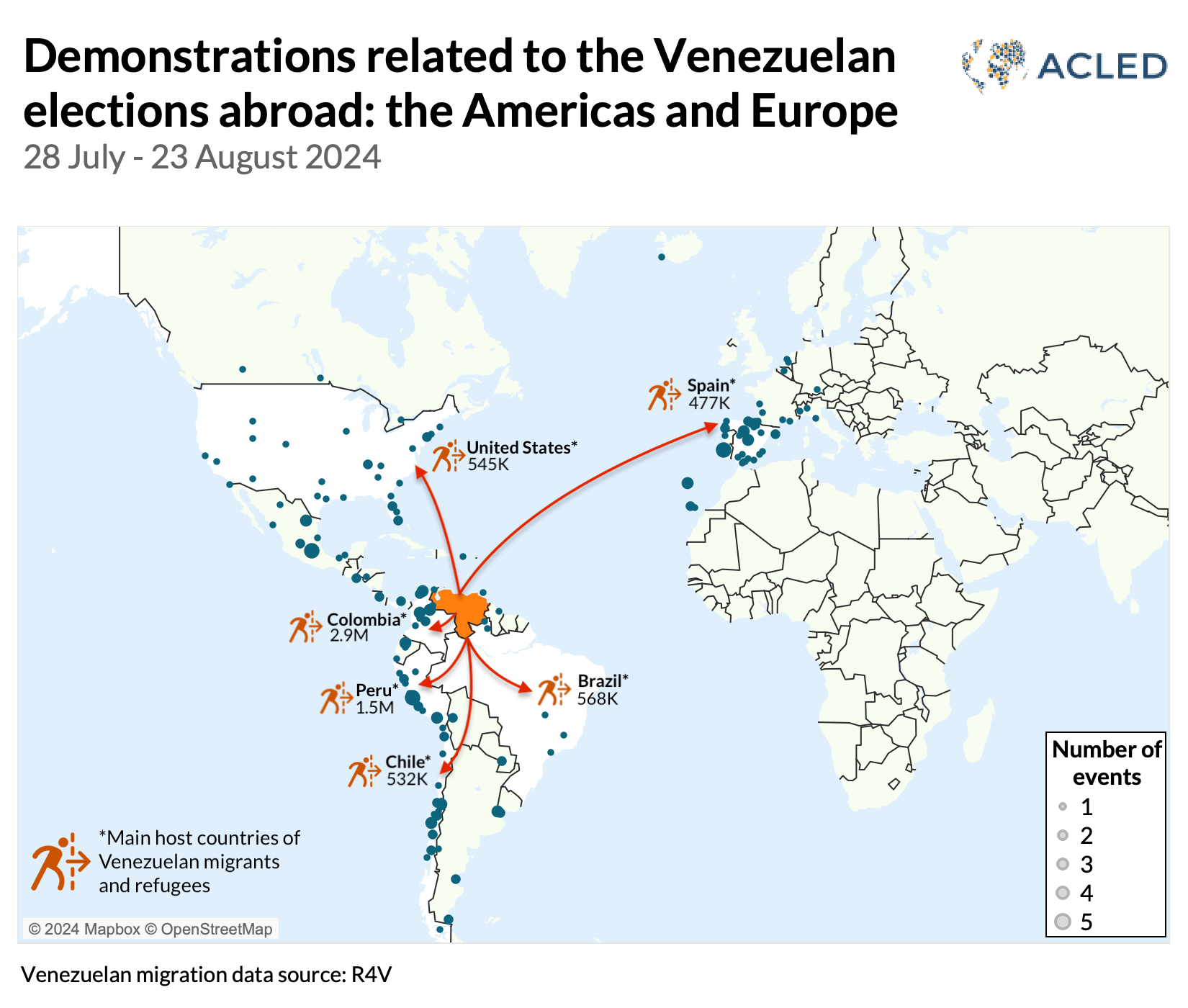One month after the 28 July presidential elections, Venezuelans demonstrated at home and abroad to demand electoral authorities publish the election tally sheets.1Joshua Goodman and Jorge Rueda, ‘Maduro opponents take to streets to revive protests disputing Venezuelan election results,’ Associated Press, 29 August 2024; Swiss Info, ‘Chavistas y opositores se manifiestan en regiones de Venezuela tras un mes de los comicios,’ 29 August 2024 The protests stem from a dispute that arose when Venezuela’s government-controlled electoral authorities declared the incumbent President Nicolás Maduro the winner. The opposition, for its part, claimed the results did not reflect the popular will, citing vote tallies it collected that show that its candidate, Edmundo González, is actually the president-elect. In response, Maduro has dubbed González a “Guaidó 2.0,”2Perfil, ‘Nicolás Maduro: “EE.UU. ha nombrado un nuevo Guaidó, Edmundo González que es un asesino, un agente de la CIA,”’ 2 August 2024 referring to Juan Guaidó, the opposition leader who declared himself interim president after rejecting the validity of the 2018 elections.
Just as in 2019, Venezuelans have protested against Maduro’s perpetuation of power through what they perceive to be fraudulent elections. In 2024, however, the protestors’ support for González and rejection of Maduro has manifested as wider mobilizations. Inside Venezuela, at least 22 protesters have been killed, mostly by pro-government militias, and over 2,400 people arrested during anti-government demonstrations since the election results were announced.3Venezuelan Human Right Action Education Program, ‘Gobierno de Maduro rompe cifras históricas de represión en Venezuela,’ 23 August 2024; NTN24, ‘“Hemos registrado el número más alto de presos políticos del siglo XXI en Venezuela”: director del Foro Penal,’ 26 August 2024 Outside Venezuela, ACLED records almost nine times more demonstrations supporting the opposition and rejecting the election results than in 2019. This reflects both the number of Venezuelans who have fled the country, which has more than doubled since then, and stronger support for an opposition that has shown greater unity and organization.4According to the United Nations High Commissioner for Refugees, around 3.4 million people had left Venezuela by February 2019, mostly to South American countries. By May 2024, this figure reached 7.7 million, and the presence of Venezuelans increased in Central and North America. United Nations High Commissioner for Refugees, ‘Venezuelan outflow continues unabated, stands now at 3.4 million,’ Joint UNHCR-IOM press release, 22 February 2019; Inter-Agency Coordination Platform for Refugees and Migrants from Venezuela, ‘Refugees and Migrants from Venezuela,’ 3 June 2024
More widespread demonstrations — and more ruthless repression — than in 2019
The announcement of Maduro’s victory on 28 July sparked an immediate outburst of protests.
- ACLED records over 280 anti-government demonstration events in Venezuela between 28 July and 23 August 2024 — 16% more than during the same period after Guaidó proclaimed victory in 2019.
- These protests took place across 121 municipalities, one-third more than during the month after Guaidó declared himself president in 2019. The surge was particularly evident in the states of Carabobo, Zulia, and Falcón (see map below).
- The single day with the most anti-government protest events since ACLED started covering Venezuela in 2018 was 29 July 2024, just after the election results were announced but even before opposition leaders called on voters to mobilize, with 86 events.
- The government response, similar to 2019, was anchored in counter-mobilization and repression, but this time was more brutal and spearheaded by pro-government militias known as colectivos. Colectivos were involved in 22 events of violence, tripling the number recorded in the context of pro-Guaidó protests, and seemed to be involved in the death of at least 19 of the 22 protesters killed in the first month after the election, compared to just two out of 34 in the same period in 2019.
- In parallel, the government organized 66 pro-government demonstrations to display public support in 44 municipalities, tripling the numbers recorded in 2019.
Demonstrations abroad reflect the growing Venezuelan diaspora and its renewed hope for change
- In the first four weeks since the election, ACLED records over 200 protests in 25 countries (see map below), with Venezuelan demonstrators sometimes joined by local citizens and political party representatives — up from just 24 demonstrations in 11 countries in the same period in 2019. For the most part, Venezuelans in other countries protested against the bureaucratic obstacles to vote, to demand free and fair elections, and to defend González’s apparent victory.
- Following opposition leader María Corina Machado’s call to all Venezuelans abroad to mobilize and demand the electoral results be respected, Venezuelans took to the streets in 92 cities across 18 countries in the Americas and Europe on 17 August alone.
- While at least 16 pro-Maduro demonstrations took place in 12 countries in 2019, ACLED records just one in Honduras and three in the United States in 2024.
Conscious that a further increase in political tensions may result in a rekindling of migration flows, most countries have taken a milder stance than in 2019. While around 60 countries recognized Guaidó as interim president in 2019, only seven have recognized González as president-elect. Instead, most have opted to call on the Venezuelan electoral authorities to be transparent and publish the vote tallies before making a decision.5Caracas Chronicles, ‘International Response to the Presidential Election Crisis in Venezuela,’ 4 August 2024; Infobae, ‘La OEA aprueba una resolución que pide publicar las actas electorales de Venezuela,’ 16 August 2024
Mobilizations will play a crucial role in the evolution of the political crisis. Much will depend on whether the opposition can maintain street pressure and international attention vis-à-vis a mounting crackdown or whether the government will manage to quash dissent and cling to power by closing ranks and relying solely on repression.
Visuals produced by Ciro Murillo.






